👋 Hi, this is Gergely with a free issue of the Pragmatic Engineer Newsletter. In every issue, I cover challenges at Big Tech and startups through the lens of engineering managers and senior engineers. If you’ve been forwarded this email, you can subscribe here. What do GenZ software engineers really think?Young software engineers discuss values, what frustrates them about working in tech, and what they really think of older colleagues. Responses to our exclusive survey.Before we start, I have a favor to ask. Closer to three years of starting the newsletter, I am still not entirely sure who reads it, and what topics you’d enjoy reading more of! I’d like to change this: but I need your help. Could you please answer 9 short questions that will help with just this. It should not take more than a few minutes of your time, but it will greatly help me with writing even more relevant articles. Thank you! These days, most new grad software engineers belong to “Generation Z” (GenZ,) having been born between 1997 and 2012. This is a cohort about which lots is written and said, but the Pragmatic Engineer is the first publication to ask GenZ engineers what they think in a survey. So, strap in as we dive into responses from the latest generation of tech talent, and find out what young professionals really think about modern workplaces and their more “experienced” colleagues! In Part 1 of this mini-series, we covered how seasoned professionals perceive their newer colleagues; covering how they view GenZ, how to mentor younger talent, approaches to working well together, and some advice from the ‘older’ generation. Now, it’s time to turn the table. In this article, we find out how GenZ software engineers see themselves, and get their takes on colleagues from the Millennial and GenX generations. Side note: it was so much fun going through the unfiltered responses from GenZ folks. Normally, we’d thank them for such honesty, but it seems that directness is a distinctive characteristic of this generation! Of course, this survey is a small sample, and catch-all terms like “GenZ” unavoidably overlook the wide diversity of thought and behavior that exists among younger tech professionals. With that said, let’s get into GenZ’s feedback. We cover:
The bottom of this article could be cut off in some email clients. Read the full article uninterrupted, online. 1. Who took part in this survey?Here’s how responses break down by role, age, region, and education. By role. Most respondents are in entry-level software engineering roles, with a few seniors and managers: By age, most respondents are aged between 24 and 27 at the time of publication: The single 20-year-old respondent in this survey is the only developer-turned-CEO; they started to code at 13 years old and founded a developer agency aged just 17, in Singapore. The company lists more than a dozen satisfied corporate customers. This kind of hustle is great to see! Region. The US and Europe are the most represented regions: Education and TechnologyInterestingly, 80% of respondents hold a computer science degree or equivalent, and 87% began computer science studies at university or college: Considering the challenging job market which new grads face, I expect more companies to only hire grads with relevant university or college degrees – and to make fewer exceptions to this. A respondent with a high-school diploma got into tech via an apprenticeship program in the UK. This person believes some senior leaders are reluctant to support GenZ’ers from non-traditional educational backgrounds (i.e.: no degree.) The respondent didn’t let this discourage them – great spirit! GenZ overrepresented in survey resultsA total of 59 GenZ software engineers took the survey, with 63 respondents from other generations, which means GenZ folks are around 4x more active in sharing their views, relative to the generational split of this newsletter’s readership. In Part 1 of this series, GenX was overrepresented: 2. How do GenZ’ers see themselves?Straight away, there are opinions which both GenZ and older generation share about the youngest professionals: More informal, open, and articulate about feelingsGenZ feels genuinely open at work, and this comes across in the survey.
GenZ also has a good sense of when they’re being misunderstood. When this happens, some GenZ’ers are acutely aware of it, and clam up:
Gaps in understanding like the above may come down to age and experience, as much as personality. GenZ wants to take part, and not be underestimatedRespondents repeatedly say they feel their true abilities are undervalued or underestimated:
It seems like some younger respondents are learning the reality that some work gets more recognition than other equally-worthy work does, like this engineer at a Big Tech giant who observes that doing stuff to “keep the lights on” (KTLO) is less appreciated:
Feeling capable of doing more than is assigned, is as old as time. The only companies that consistently push new-grad colleagues to exceed their capabilities are early-stage startups, where hands-on managers spot standout hires and give them extra responsibility. If you feel unchallenged, or that you have an unexpectedly light workload, know that this is not personal. Giving new joiners less responsibility and more time to learn is a hallmark of a considerate workplace or manager! Rather than complain, the solution is to do standout, exemplary work. Consider taking on extra work and making a great job of it. Seek feedback from your manager and if they agree it’s solid, tell them you’re ready to help the team even more. This kind of proactive approach should quickly yield results, and contribute to faster professional and career growth. Salary and benefits matterAnswering the question, “if you quit your current job, what would be the most likely reasons?” 37% of GenZ mentioned promotion, salary, or benefits. A few responses:
Switching jobs for financial reasons is common enough across generations. In tech, it’s well known that switching jobs is the fastest way to earn what you’re worth. It is interesting that many GenZ’ers understand this, right at the start of their careers. Just don’t forget that at senior levels, tenure can be increasingly important for promotion to the next level. More on this topic in Preparing for promotions ahead of time. Respondents with a “good deal” appreciate it, but the assumption that GenZ demands high financial compensation doesn’t fairly reflect the sentiment of survey responses. Several mention that they’re happy with their compensation and perks of the job like a nice commute, free food, and parking. For example, here’s a software developer at a large US airline, on what they like about their job:
GenZ know when they have a “worse” deal than peers. A common theme in responses is that people can identify when their compensation or benefits seem unfair:
On the issue of comp, the responses suggest GenZ respondents are pretty grounded: they appreciate their benefits and attractive compensation, but they’re also unafraid to speak up when they’re paid below-market, or have subpar benefits. Bias for modern techGenZ respondents express a preference for exploring technologies, and they dislike legacy tech debt. Several say they’re ready to switch jobs for more freedom to explore technologies, to work on more interesting systems or tools, and to escape systems with heavy tech debt. For a sense of the tech stack, below is a list of technologies which respondents used before getting their first tech jobs: Languages:
Frameworks and tools:
Each respondent used a subset of this list, and almost all have used several languages and frameworks before getting their first tech job. It seems that picking up new languages and frameworks “on the go” is second nature to GenZ. Relatedly, they’re also ahead with new technologies, and like to try out and adopt new technologies: backend libraries like routing controllers, web frameworks like Nest, and languages like Typescript, Kotlin, and Rust. They get frustrated when it seems like older colleagues are holding them back, and see their more seasoned peers as “stuck” in their ways – even with things like using default IDE light settings! Red tape is frustrating, as it is for every generation. An engineer shared the experience of waiting a week for approval to install Node.js. Someone else declaimed their company for encouraging learning, while having way too much red tape to actually employ useful technologies. Another mentioned that senior colleagues don’t realize how much friction is in current systems, which gets in the way of efficient working. Discovering work is tougher than expectedA few responses mention the learning curve for new joiners who discover their work is actually harder than expected, or that coding is only one part of the job. Here’s a 26-year-old developer who works at a bank in the US:
I emphasize with this dev, as I felt the same when working at a bank, where the development part of the job was trivial, and interacting with the business was much more important. There are plenty of jobs which stretch software engineers, but it sounds like this person is in a workplace where engineering is a cost center. They would likely be happier somewhere where it’s a profit center, like a startup, bootstrapped company, or a larger tech-first company. More on cost centers vs profit centers at tech companies. Other experiences will be familiar to many readers from their first jobs in tech, or when joining a new company. On dealing with pushback:
A GenZ engineer at a startup also shared that business growth has made their workplace a lot more political. Navigating internal politics and gaining influence with colleagues is always tricky, and involves building influence within the organization, or your team. This takes time, and a track record of great work makes it easier. One respondent finds themselves working in a siloed organization, which slows down the work:
This is the unfortunate reality of a hard-to-change company culture, combined with the challenge of working on a platform team. There are no easy solutions, but the earlier you’re aware of the problems, the sooner you can decide whether to tackle them, or just remember to avoid similar setups in future. Work not a core identityIn the first part of this mini-series about this survey, some older colleagues noted that GenZ colleagues guard their free time much more than other generations. Talking with engineering leaders, this sentiment is common. But in the survey, only one GenZ professional mentioned it. From a fullstack developer at a scaleup, in the EU:
Articulate and direct in speechThe survey responses show that GenZ is direct and to-the-point in communications, compared to more senior colleagues. Almost all respondents describe themselves as “straight-shooters.” 3. ValuesWhen asked what they value most about their workplace, GenZ respondents say: Work-life balance, flexibility, autonomyFlat company structures that offer autonomy were repeatedly cited:
Flexibility, and decent work-life balance are valued by generations of software engineers value, and GenZ is no different:
A backend engineer in India noted they have very stressful, 60+ hour working weeks, which is making them consider resigning in order to take a break – even though they’re learning a lot from being at a Series A startup. Long-term overwork is always a challenge, regardless of age. An amusing comparison comes from a Google Cloud engineer who previously worked at Amazon, who mentions their work-life balance is “much better compared to Amazon.” As always, it is tricky to compare two companies with 100,000+ employees each. Amazon is generally known for its high expectations, as previously covered in Amazon’s engineering culture. Valuing remote or hybrid work, versus fully onsite. Unsurprisingly, several respondents say it’s important to be able to work remotely, or at least not have to be at the office every day. This expectation likely reflects the market reality in tech, where many employers have settled on a hybrid pattern of 2-3 days/week in the office. Company values matterOpen, transparent culture. Respondents working at companies with this kind of culture appreciate it, while engineers in places without these qualities would prefer more transparency.
Working with great people. Team spirit, friendly coworkers, down-to-earth managers, and straightforward colleagues, are qualities identified by GenZ respondents who like their current workplaces. Purposeful, rewarding work that’s useful. Below is a quote from someone well aligned with their company’s mission, who’s having a good time:
Another respondent mentioned they appreciate the freedom to help grow the company:
One in three GenZ respondents would quit if their workplace’s culture is wrong. We asked respondents: “If you were to quit your current job, what would be the most likely reasons?” 35% of respondents mentioned one of:
I would interpret the above as “critically important” parts of the job for these respondents: meaning that if these areas are “in the red,” then the chance of them quitting becomes very high. Managers who careSpecifically, managers who care about team members. This really makes a difference, as per some responses:
GenZ respondents with managers whom they see as low quality, say that it’s souring an otherwise positive experience. Here’s a robotics software engineer at a defense technology scaleup sharing what sounds like less than optimal manager fit:
Onboarding, learning opportunities, mentorshipBased on the survey, It seems good onboarding, helpful documentation and supportive mentorship, are top of mind for many GenZ folks:
Could onboarding challenges be down to a generational divide? One respondent notes that older engineers don’t care much for keeping up with documentation, and that it’s younger engineers doing this consistently.
Generational differences in preference for spoken or written communication are mentioned below, too. We covered What good and standout onboarding processes look like for software engineers. Professional growthSome respondents are positive about their current employer because they feel they learn on the job:
Having space for self-directed learning is something a few responses mention. These people don’t expect dedicated training, but get to grow their skills with freedom in how they get things done. Absence of mentorship, coupled with autonomy, promote this approach:
Dedicated learning and development (L&D) days are mentioned in just one response, at a tech consultancy in the UK, where one day per week is dedicated to L&D, or working on internal projects. Consultancies often sell specialist development skills, like expertise in languages like TypeScript or Go, or technologies like ML or AI. L&D can help a company close more clients by giving employees time to specialize in the new technologies customers need. Documentation and developer experienceExceptional – or even just good! – internal documentation processes are cited by several GEnZ respondents as a big positive. Respondents from workplaces which lack technical documents say they want this to change. The importance of good developer experience was highlighted by young professional at Meta, which does invest heavily in this area:
4. FrustrationsThe survey asks GenZ respondents which areas their employers could do better in. Here’s their most common frustrations in descending order. Lack of career progressionGetting ahead at work is mentioned most often:
Onboarding, documentation, mentorshipAbsence of structured onboarding, documentation, and mentorship, are often cited as areas for improvement in GenZ’s survey responses:
How much structured mentoring and L&D are available depends on the type of person the company hires, and the internal culture. Early-stage startups rarely offer either, but new joiners get to learn on the job with impactful work assignments. Judging by the survey responses, large companies with resources and plenty of internal systems could improve at showing young colleagues how and why things work, or new joiners may struggle to achieve basic productivity. Too much process – or not enoughSeveral GenZ folks call out heavyweight process as a lowlight of their jobs:
To be fair to bosses, some processes must be in place to avoid chaos during a growth phase. Product proposals (often called Product Requirement Documents, aka PRDs) are used by scaleups-and-above, as are RFCs and design docs. It comes down to finding the right balance; there is rarely – if ever – a “perfect” process, and the best a team or company can do is slash unnecessary processes, while resisting the urge to create a new one for each new problem. On the other hand, too little process is also cited as a problem by some GenZ respondents. A software engineer at a mid-sized tech company in France shares valid criticism of their company, which the CTO might be wise to note:
Problems with the businessFounders, CEOs, and CTOs would do well to ask their youngest colleagues what they think of their company’s business outlook, based on the survey responses. Several people share that their biggest issue is that the business is doing badly and that things will get worse unless the leadership turns things around. The biggest business problems mentioned by GenZ professionals, in quotes:
5. What GenZ really thinks of older colleaguesSo, how do GenZ software engineers see “more experienced” colleagues? There are some common themes, but no two responses are identical. In workplaces, the age spread of GenZ professionals is only around 8 years at present, assuming the youngest are aged 18. Meanwhile, other generations are spread across a much wider timespan of up to 40+ years, which makes generalizations even more inevitable, but less specific! As such, the below should be taken with a pinch of salt as everywhere is different. If you’re a senior professional who recognizes themself in this feedback, I hope you get a smile out of it! Self-awareness is a useful quality. “Old people’s talk”Many GenZ respondents say that much of the chat at work is about topics like family and kids, property ownership, and home-construction projects. One respondent notes: “I can't tell you how many times I've listened to the older guys talk about their kitchen remodels.” In general, “watercooler chat” reflects where people are in their lives; in the future when GenZ folks comprise most of the workforce, they’ll likely chat about similar domestic topics which sound irrelevant and dull today, when their lives are less settled and predictable. A bimodal split in attitudes to workInterestingly, there are two common but contradictory themes in many GenZ responses about how older colleagues folks see work:
An engineer in the US summarizes it:
All workplaces and generations contain people who see work as just a job, and others who pour their hearts and souls into it. My guess would be GenZ also has a similar split, but it hasn’t revealed itself yet. A GenZ software developer in Finland says:
Written communication doesn’t improve with agePerhaps unexpectedly, several GenZ respondents say older colleagues have weak written communication skills. This turns on its head the ever-popular stereotype that each generation is a bit worse at writing than the one before it:
Here’s a sentiment many GenZ folks express:
In a related observation, a Millennial engineering manager says this generation prefers text messages to meetings:
Harsh feedback“Harsh” is a word used by several young professionals to describe older colleagues, especially managers:
I assume some of this is individual feedback with critique. It’s possible to imagine this could be alarming to some young professionals unfamiliar with unvarnished professional communication, especially when it’s unexpected. Falling behind in the tech racePlenty of GenZ respondents reckon older colleagues don’t keep up with new technological developments due to lack of curiosity. One gripe is that some older colleagues don’t know or care about tech beyond the company’s walls. I suspect this criticism applies to individuals, rather than being a universal characteristic of non-GenZ professionals. Underestimating Artificial Intelligence (AI)Several GenZ respondents say older colleagues are slow to embrace AI:
Experienced – sometimes more than expected!GenZ doesn’t think older colleagues are totally useless, though. Many responses identify strengths and skills which older colleagues possess that impress less experienced co-workers.
On estimations:
Some respondents admit being surprised by the depth of older colleagues’ knowledge:
Supportive of younger colleaguesSeveral respondents say more experienced folks are understanding and accommodating of newcomers. One GenZ professional shares that they feel lucky to work with older individuals who help them succeed, while other respondents cite senior colleagues as smart, kind, helpful and amazing colleagues, which is nice to hear. Several others say they have nothing to complain about with regards to older colleagues, and see eye-to-eye with them. As always, so much of our experience at work depends on other individuals. A comment by a full stack developer in Sweden speaks to this:
One-off observations about older colleagues
Amusing observationsOlder colleagues are regularly clueless about tech YouTubers, claims one respondent in a jab at the low regard some older colleagues have for dev-influencers:
I’ve linked the channels for anyone interested in checking them out – all are interesting.
Not so different, after all?Here's an observation about how older colleagues are all different, from a senior engineer at a crypto scaleup in the US:
In closing, here’s a software engineer in the US who points out that, ultimately, most of us in tech have more in common than not, whichever generation we’re in.
This observation is a good reminder that in many ways, age is just a number. What matters most is someone’s attitude to technology and to progress, which matters much more than their age. 6. Good and bad managersWe asked GenZ if their managers “get” them, and people’s responses reveal what young tech workers think makes for a good or bad manager. Good managers
One respondent mentions that their manager “feels like a friend, and we’re honest with each other.” This suggests a lot of trust, but fundamental power dynamics in such relationships mean it can be risky to form friendships at work because things can change fast. Still, I’ve observed plenty of former managers staying friends with their former direct reports, which speaks to genuine connections. Bad managers
Regarding the final point, a software engineer at a Big Tech shares:
“Good” versus “bad” traits feel generationally independent. Good managers tend to be empathetic, make their direct reports feel supported, and actively support their professional growth. Managers perceived as “bad” usually don’t have an open communication line with their reports, don’t help the team or individuals to improve, and leave colleagues second-guessing why they’re a manager! 7. Comradery with Millennials, but not GenX?A common theme in GenZ’s responses is negative experiences with GeX folks – colleagues who are 20+ years older, and are usually managers:
Differences between GenZ and GenX seem most pronounced, which likely has a lot to do with the age gap, which is the widest possible now that many Baby Boomers have retired. A 10-year age gap seems to not be a big deal – except when it is. From an ML engineer at a startup in Germany:
Of course, being biased towards similarly-aged people is very normal.
TakeawaysThe first survey conducted of GenZ software engineers in tech workplaces provides insights, and some reassurance that professionals of all ages have plenty in common! Thank you to all young professionals who took part in this Pragmatic Engineer survey! It’s been a blast sifting through the responses from the latest generation of tech talent, who will go on to shape our industry in the future. It’s also clear that labels like “GenZ,” “Millennial,” and “GenX,” overlook the complexity and diversity of individuals who make up these massive cohorts. Nonetheless, generalizing accurately, based on responses, is one task of surveys. We hope this article gives a sense of what it’s like being young and in tech, in GenZ’s own words. Many differences between this generation and older tech workers seem to come down to the factors of age and experience, and we can assume that it was always so. In many workplaces, there is no problematic “generation gap.” My sense is that young professionals don’t complain when older colleagues are accommodating, friendly, helpful, and managers care about helping their reports succeed. In contrast, problems emerge when organizations favor process over progress, managers visibly don’t care about their reports, and businesses are struggling. Based on the detailed responses of GenZ professionals, they seem like an energetic, honest bunch, who are ready to make a difference. A few respondents say some older colleagues are jaded. GenZ feels like the exact opposite. Respondents to this survey want to do good work, and many seem to be doing well in their careers to date. They have on-point observations, and no problem with expressing their thoughts in writing. If anything, they might be better written communicators than older professionals! GenZ respondents are clearly ambitious, and have been picking up new technologies since high school. There may be a bimodal distribution of ambition in this generation, but based on the responses to this survey, I’m bullish about GenZ’s qualities and prospects. If you are a manager with open headcount, I hope this article persuades you to consider new grads, among whom there are surely some standout performers. Finally, personal attitude matters more than someone’s age. An observation from one GenZ engineer working at a Big Tech has stuck with me, about how technology improves and adapts over time, and that people in their workplace have adopted the same mindset. The most successful tech professionals keep an open mind, experiment with new ways of doing things, and withhold judgment until they try something. Do this as an older professional, and I predict working with GenZ professionals will be easy. I hope you found this two-part series interesting and even a bit entertaining! For part one, see GenZ software engineers, according to older colleagues. Anonymized raw dataFull subscribers can access the original, anonymized data set. Finally, if you’ve not done so, can you please answer these 9 questions about what topics you’d enjoy reading more in the newsletter, and anonymized demographic details. These will help me write even more relevant articles. Thank you! You’re on the free list for The Pragmatic Engineer. For the full experience, become a paying subscriber. Many readers expense this newsletter within their company’s training/learning/development budget. This post is public, so feel free to share and forward it. If you enjoyed this post, you might enjoy my book, The Software Engineer's Guidebook. Here is what Tanya Reilly, senior principal engineer and author of The Staff Engineer's Path said about it:
|
Search thousands of free JavaScript snippets that you can quickly copy and paste into your web pages. Get free JavaScript tutorials, references, code, menus, calendars, popup windows, games, and much more.
What do GenZ software engineers really think?
Subscribe to:
Post Comments (Atom)
I Quit AeroMedLab
Watch now (2 mins) | Today is my last day at AeroMedLab ͏ ͏ ͏ ͏ ͏ ͏ ͏ ͏ ͏ ͏ ͏ ͏ ...
-
code.gs // 1. Enter sheet name where data is to be written below var SHEET_NAME = "Sheet1" ; // 2. Run > setup // // 3....

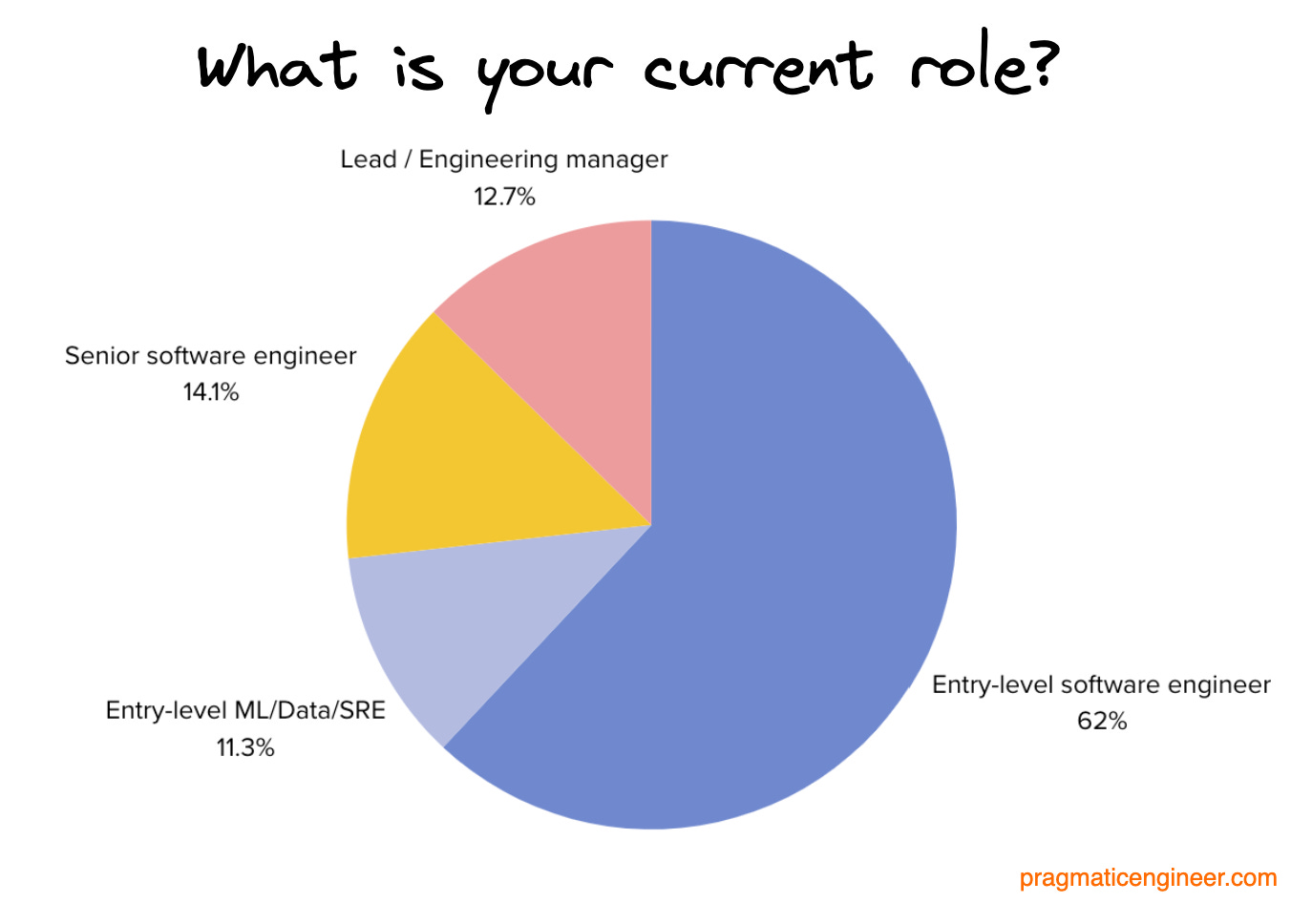
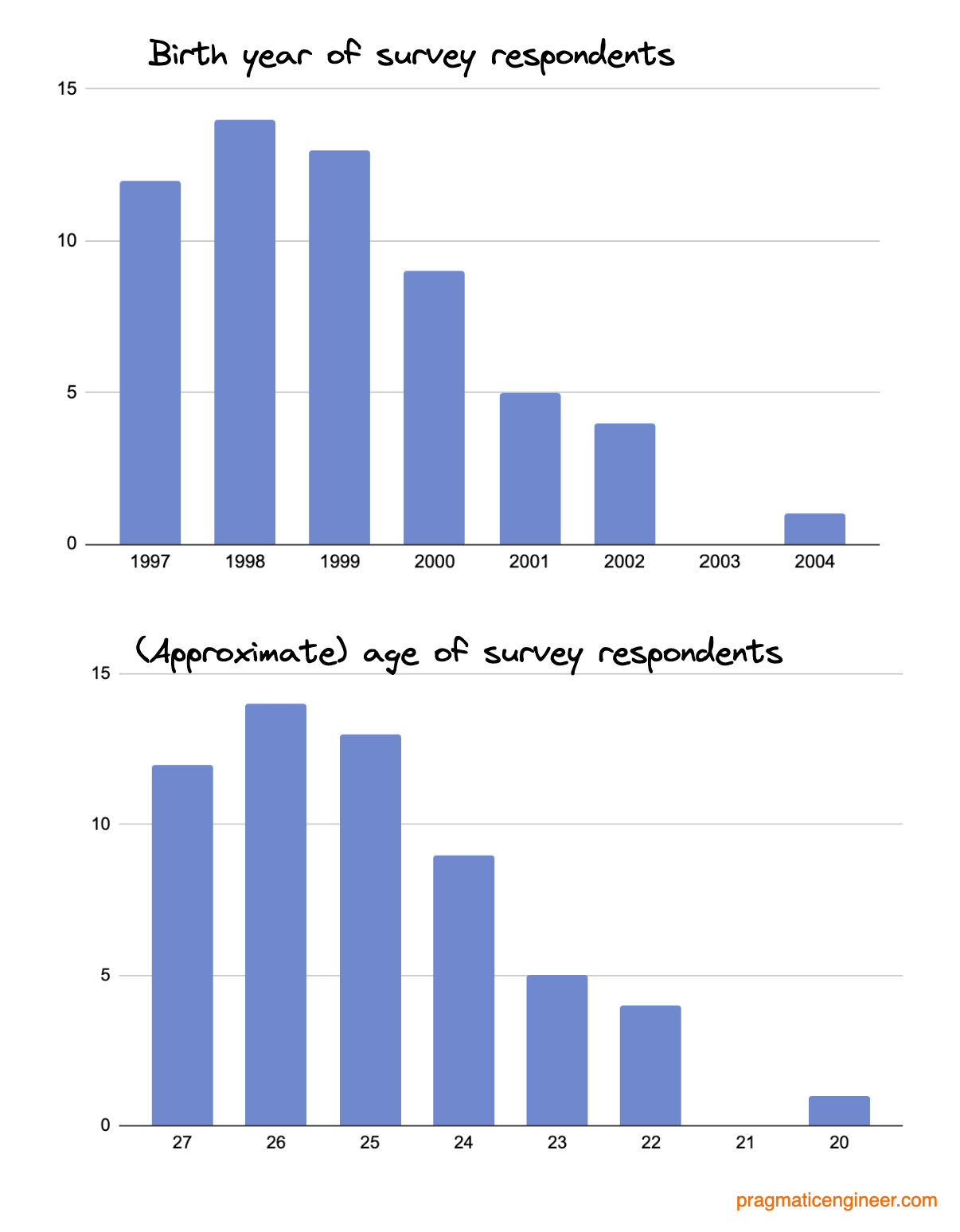
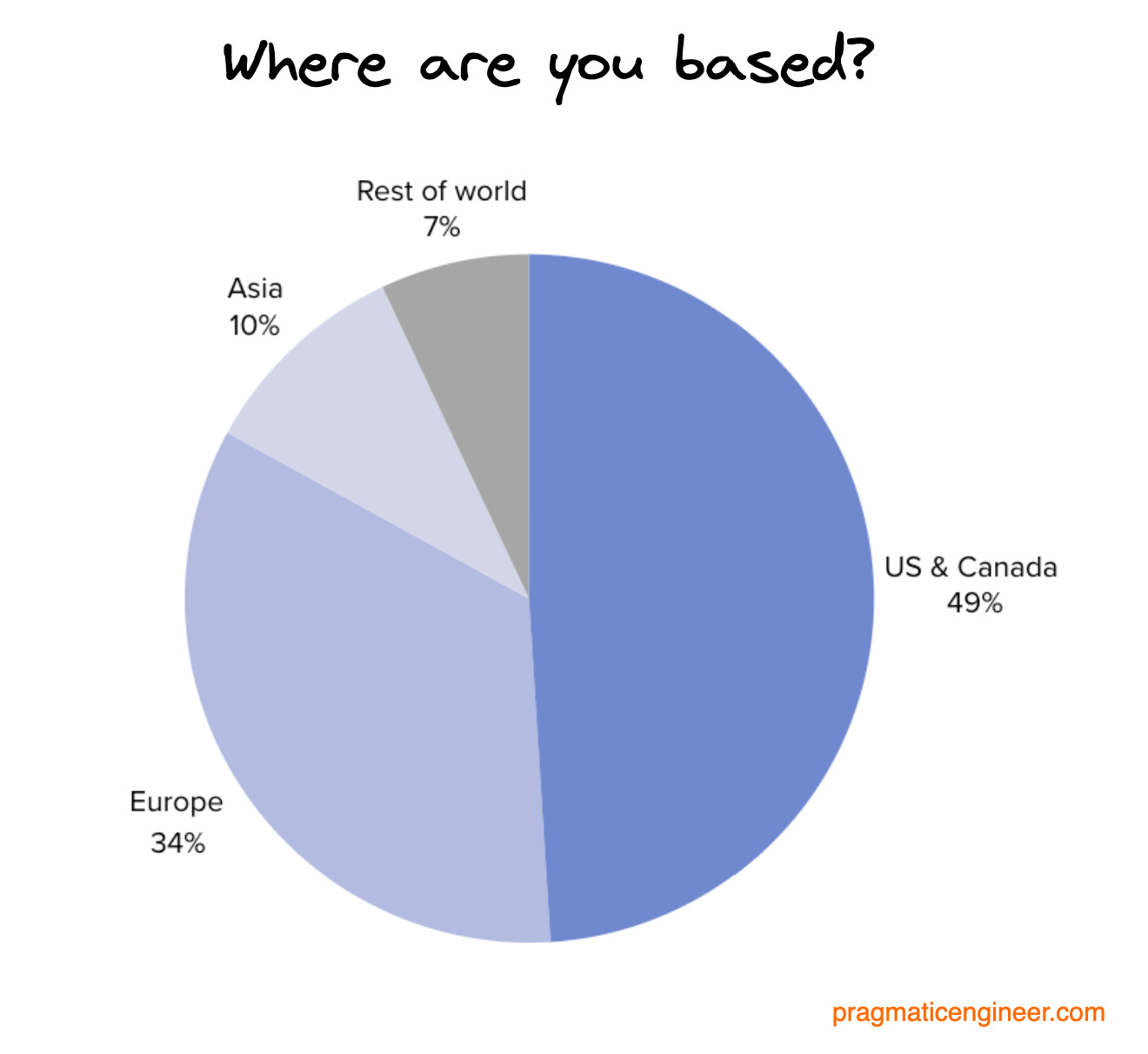
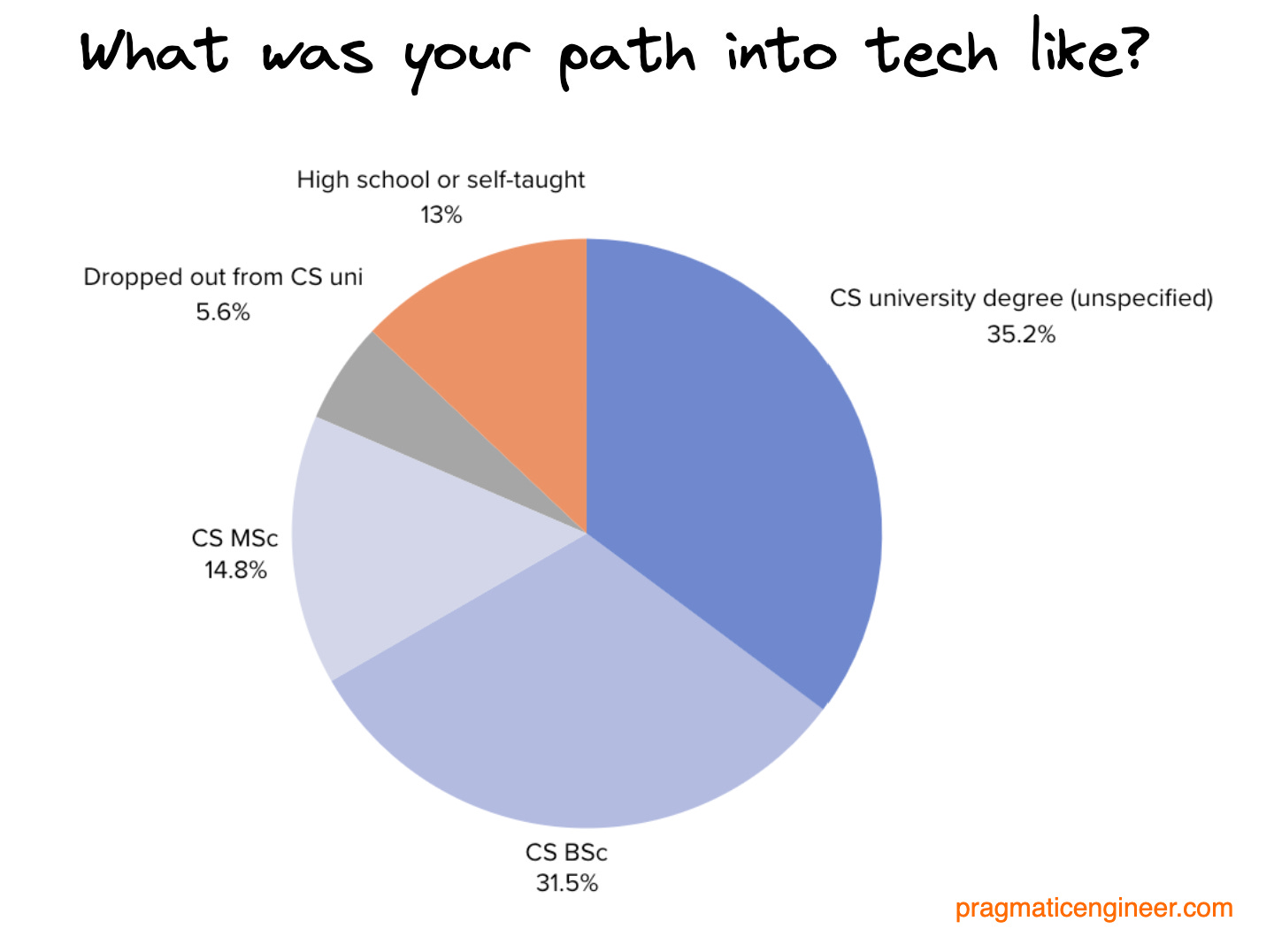
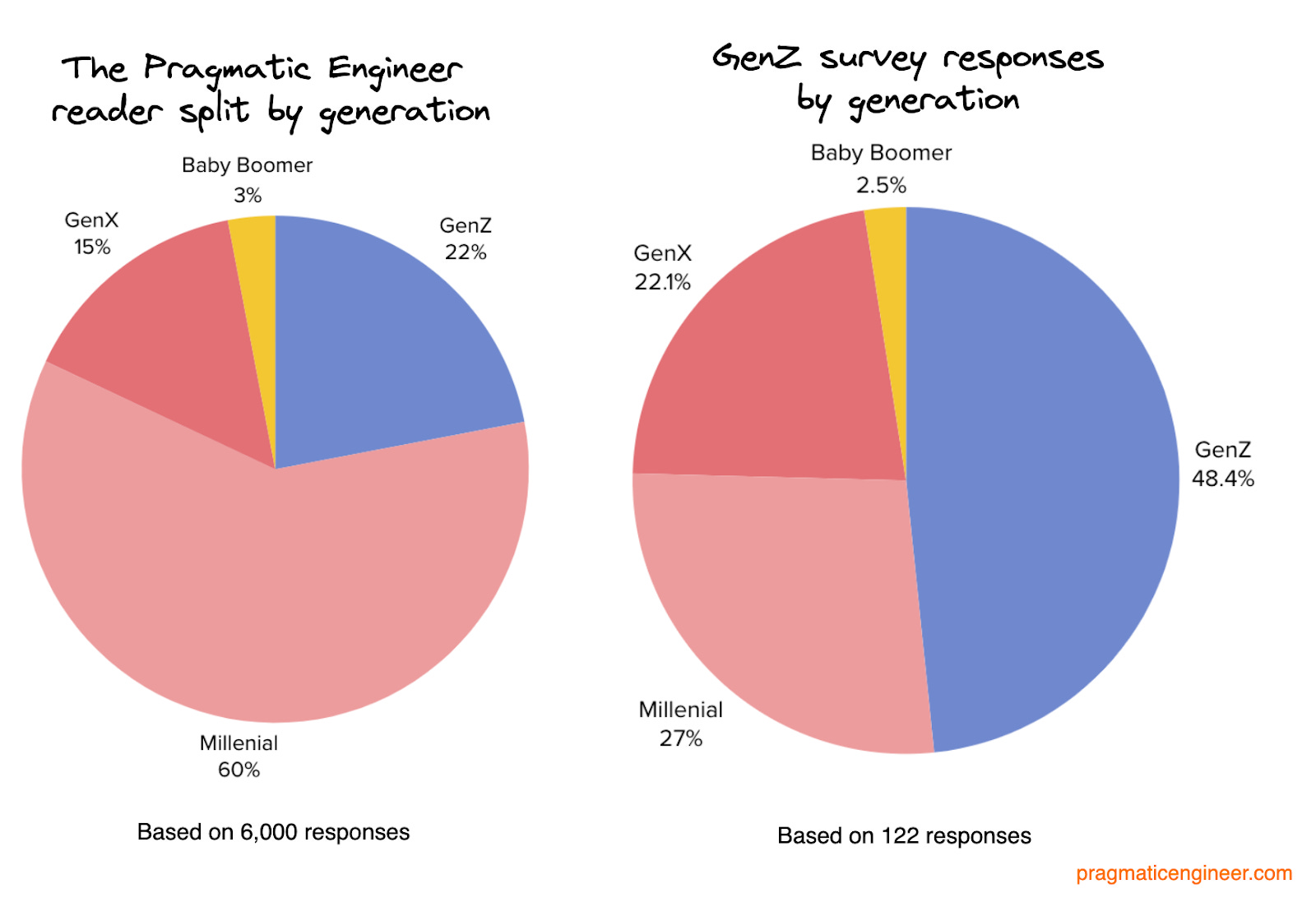
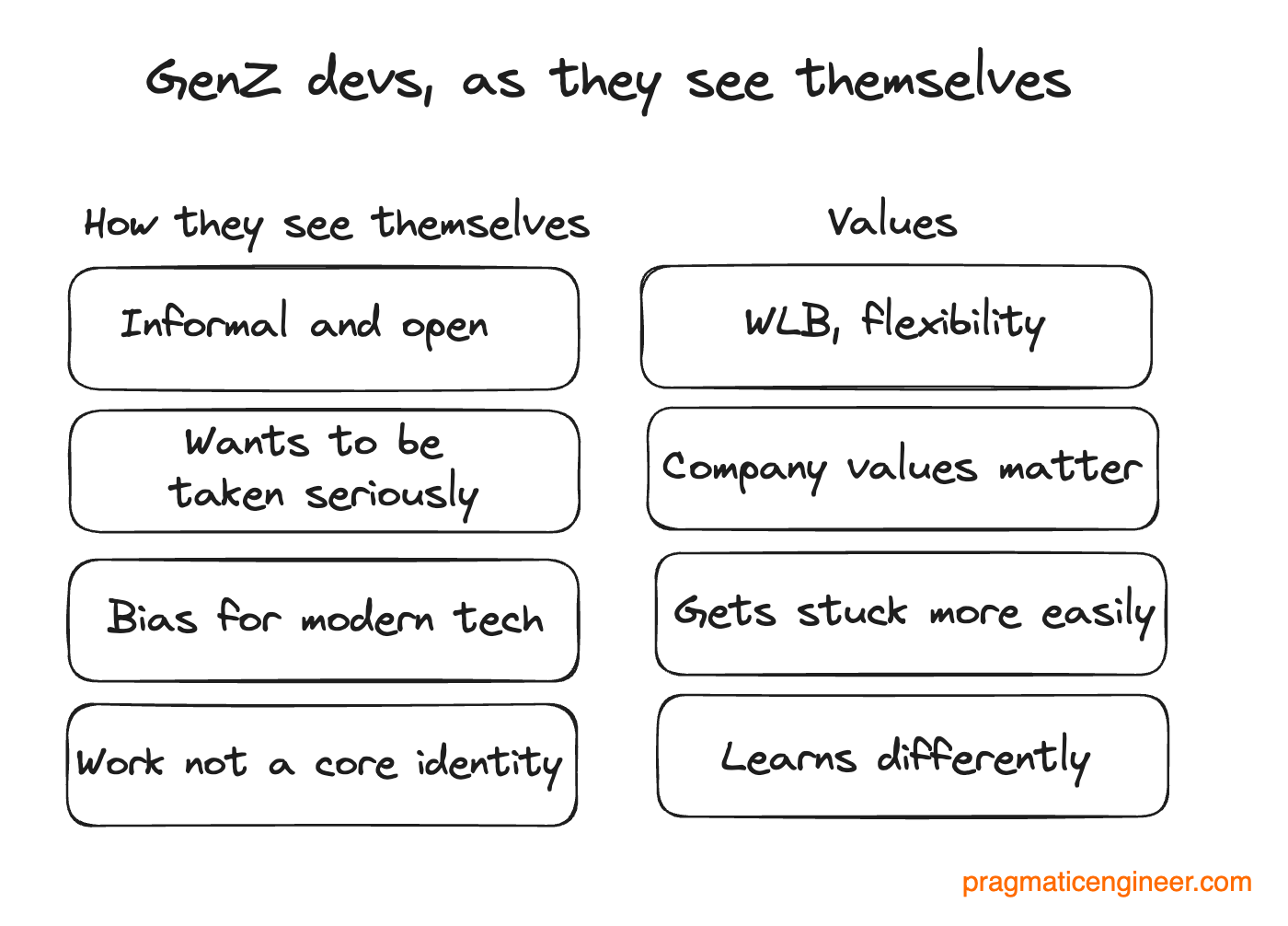

No comments:
Post a Comment